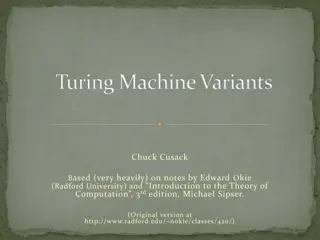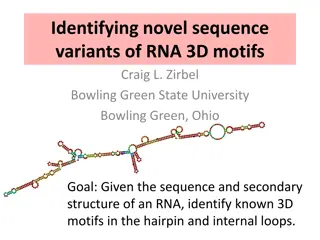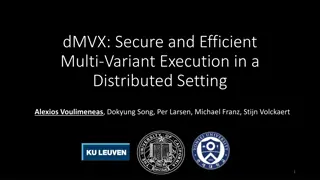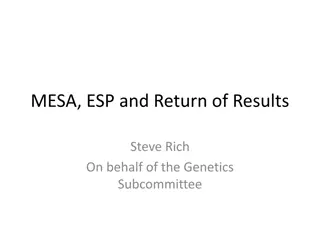Understanding Variants and Unions in C++
Variants and unions are essential concepts in C++ programming for managing heterogenous data and optimizing memory usage. Variants allow storing objects of multiple types in a single container, while unions provide a way to efficiently utilize memory by sharing the same storage space for different types of data. This article explores the definitions, use cases, and differences between variants and unions, with practical examples and best practices. Learn how to leverage these language constructs to enhance your C++ programming skills.
Download Presentation

Please find below an Image/Link to download the presentation.
The content on the website is provided AS IS for your information and personal use only. It may not be sold, licensed, or shared on other websites without obtaining consent from the author. Download presentation by click this link. If you encounter any issues during the download, it is possible that the publisher has removed the file from their server.
E N D
Presentation Transcript
STRICT_VARIANT A simpler variant in C++ Chris Beck https://github.com/cbeck88/strict_variant
What is a variant? A variant is a heterogenous container. std::vector<T> many objects of one type std::variant<T, U, V> one object of any of T, U, or V AKA tagged-union , typesafe union
What is a union? struct bar { // Size is sum of sizes, short a; // plus padding for alignment float b; double c; }; union foo { // Size is max of sizes, short a; // alignment is max of alignments float b; double c; };
union foo { short a; float b; double c; }; int main() { foo f; f.a = 5; f.a += 7; f.b = 5; f.b += .5f; } Storing to union may change the active member. Reading inactive member may lead to implementation-defined or undefined behavior!
Why would you use this? Need to store several types of objects in a collection, but no natural inheritance relation. Using an array of unions, store objects contiguously, with very little memory wasted. Low-level signals / event objects Messages matching various schema
struct SDL_KeyboardEvent { Uint32 type; // SDL_KEYDOWN or SDL_KEYUP Uint8 state; // SDL_PRESSED or SDL_RELEASED SDL_Keysym keysym; // Represents the key that was pressed }; struct SDL_MouseMotionEvent { Uint32 type; // SDL_MOUSEMOTION Uint32 state; // bitmask of the current button state Sint32 x; Sint32 y; }; union SDL_Event { SDL_KeyboardEvent key; SDL_MouseMotionEvent motion; ... };
Why would you use this? A variant is a type-safe alternative to a union Prevents you from using inactive members Ensures that destructors are called when the active member changes crucial for C++!
Query the active member using get: void print_variant(boost::variant<int, float, double> v) { if (const int * i = boost::get<int>(&v)) { std::cout << *i; } else if (const float * f = boost::get<float>(&v) { std::cout << *f; } else if (const double * d = boost::get<double>(&v) { std::cout << *d; } else { assert(false); } } boost::get returns nullif requested type doesn t match run-time type.
Better, use a visitor: void print_double(double d) { std::cout << d; } void print_variant(boost::variant<int, float, double> v) { boost::apply_visitor(print_double, v); } This only works because int, float can be promoted to double as part of overload resolution.
Using a lambda as a visitor (C++14): void print_variant(boost::variant<int, float, double> v) { boost::apply_visitor([](auto val) { std::cout << val; }, v); } No promotion here! More generally, use templates in the visitor object.
Recursive Data Structures (XML) struct mini_xml; using mini_xml_node = boost::variant<boost::recursive_wrapper<mini_xml>, std::string>; struct mini_xml { std::string name; std::vector<mini_xml_node> children; }; recursive_wrapper<T>is syntactic sugar It works like std::unique_ptr<T> But when visiting, or using get, can pretend it is T.
Pattern Matching (Rust): enum Message { Quit, ChangeColor(i32, i32, i32), Move { x: i32, y: i32 }, Write(String), } fn process_message(msg: Message) { match msg { Message::Quit => quit(), Message::ChangeColor(r, g, b) => change_color(r, g, b), Message::Move { x, y } => move_cursor(x, y), Message::Write(s) => println!("{}", s); } }
Pattern Matching (C++): using Message = boost::variant<Quit, ChangeColor, Move, Write>; void process_message(const Message & msg) { boost::apply_visitor( overload([](Quit) { quit(); }, [](ChangeColor c) { change_color(c.r, c.g, c.b); } [](Move m) { move_cursor(m.x, m.y); } [](Write w) { std::cout << w.s << std::endl; }), , msg); }
Existing Implementations boost::variant std::variant (C++17) strict_variant (this talk) and others... Surprisingly, many significant design differences and tradeoffs!
Problem: Exception Safety How to handle throwing, type-changing assignment. ~A() Now B(...) throws... Now what? A is already gone, and have no B B A 1
Solution: Double Storage If B(...) throws, still have A ~A() When C comes, flip back to first side C B A B 1 5
Solution: boost::variant First move A to heap. (If it fails, we are still ok.) If B(...) succeeds, delete A pointer. If B(...) fails, move A pointer to storage. (Can t fail.) B A B 1 2 4 A*
Solution: std::variant ~A(), set counter to 0 Now B(...) throws... Now we are empty . valueless_by_exception() reports true visiting is an error until new value provided! B A 1 0
Tradeoffs Because of C++ language rules, we can t have everything we want. No wasted memory No empty state Strong exception-safety, rollback semantics No dynamic allocations, backup copies
Solution: strict_variant If B(B&&)can t throw, great, do the obvious. If B(B&&) can throw, B always lives on heap. Construct Bon heap. If it fails, didn t touch A. ~A(), then move B*to storage. Can t fail. B B A 1 2 B*
strict_variant design High level design: Reducing to a simpler problem. 1. Make a simple variant which assumes members are nothrow moveable. (This is easy!) 2. Then, to make a general variant, stick anything that throws in a recursive_wrapper and use the simple code. (Pointers can always be moved!)
Step 2, the reduction, fits here on the screen. template <typename T> struct wrap_if_throwing_move { using type = typename std::conditional< std::is_nothrow_move_constructible<T>::value, T, recursive_wrapper<T> >::type; }; template <typename T> using wrap_if_throwing_move_t = typename wrap_if_throwing_move<T>::type; template <typename... Ts> using variant = simple_variant<wrap_if_throwing_move_t<Ts>...>;
Why use strict_variant instead of boost::variant? boost::variant supports even C++98 This means, it has to basically work even if we can t check noexcept status of operations. This greatly limits design options. strict_variant targets C++11 This allows an, IMO, simpler and better strategy.
Empty State no Exception Safety yes Backup Copies no Number of states 2n double storage yes no no n+1 std::variant no yes yes 2n boost::variant no yes no n strict_variant
Other features boost::variant and std::variant sometimes do annoying things std::variant<int, std::string> v; v = true; // Compiles! Because of bool -> int :( std::variant<bool, std::string> u; u = "The future is now!"; // Selects bool, not std::string! :( strict_variant uses SFINAE to prevent many evil standard conversions here.
THANK YOU http://chrisbeck.co http://github.com/cbeck88/























